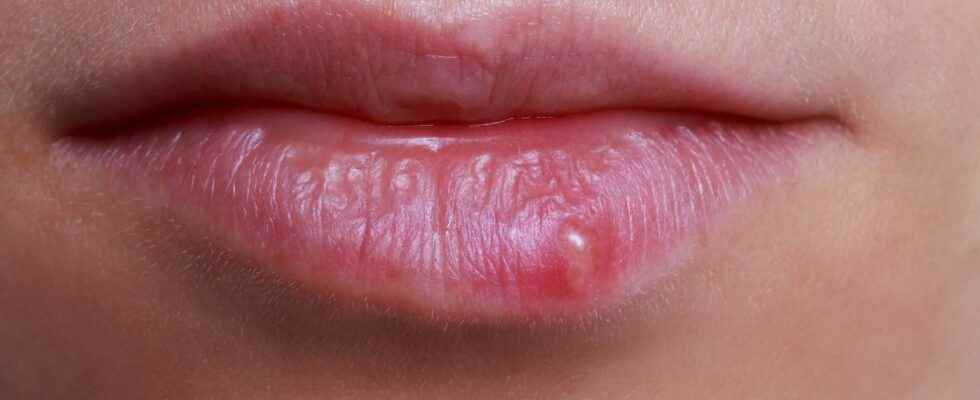Seven million people in France suffer from cold sores, commonly known as cold sores. This very contagious and annoying infection should not however be confused with an acne pimple whose causes and treatments are very different.
A herpes labial, also called soreis an infection due to virus herpes simplex type 1 (HSV-1), which is transmitted by contact with a contaminated surface (for example when drinking from the same glass as an infected person), when the lip has a lesion (chapped, cut lip, etc.) .
How to recognize a cold sore?
The cold sore appears on the edge of the lip in the form of small blisters translucent in a “bouquet” with liquid inside. The appearance of pimples is preceded by warning signs (tingling, burning, itching) 2 days to 6 hours before. After a few days, the vesicles will break through and form scabs.
Cold sores can be treated with antiviral balms or creams, or sometimes tablets. These must be taken at the very beginning of a flare-up or prevention (even before pimples appear) to be effective.
Recognize an acne pimple
the pimple is not caused by a virus and is not contagious. It is caused due to inflammation caused by clogged skin pores. Unlike cold sores, the pimpleacne will not be located on the lip but on the periphery (for example at the corner of the lip) in the form of a small papule filled with pus. It is much smaller and takes the form of a red button with sometimes a white or black tip.
Normally, an acne pimple is bothersome but it doesn’t scratch. It heals in two or three days and does not form a scab. Acne can be treated either by antibiotics (cyclins), or with treatments (retinoids local or oral) which temporarily atrophy the glands sebaceous to limit outbreaks.
Common points between acne and cold sores
Both cold sores and acne pimples are chronic pathologies and evolve in outbreaks that can be more or less prolonged and frequent (up to several outbreaks per month). Some people seem more predisposed than others, and there are often triggering factors (stressfatigue, local trauma, exposure to sun…). For acne, the frequency generally decreases after 20 years.
Avoid scratching, touching or pierce pimples : you risk creating a door entry point for a secondary infection and in the case of herpes, to spread the virus to other parts of the body.
Interested in what you just read?
Subscribe to the newsletter Health question of the week : our answer to a question you ask yourself (more or less secretly). All our newsletters
